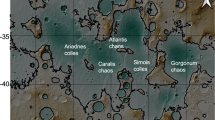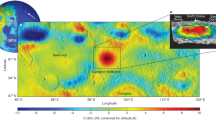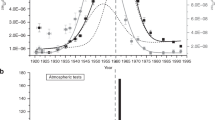Abstract
IN my letter of June 19 I briefly outlined three arguments which consistently point to a concentration of the radio-active elements in the earth's crust, such concentration having been accomplished at the expense of the material of the interior. The first of these arguments (in which the limited distribution of the radio-elements is deduced from the earth's temperature-gradient) is made the basis of a revival of Arrhenius's view that radio-active disintegration may be inhibited under the conditions prevailing at great depths (NATURE, June 26, July 10, and July 17). Thus, in place of the deduction that the amounts of uranium and thorium existing in the earth's interior are negligible, even thermally negligible, is put forward the alternative deduction that these parent elements are not necessarily absent, but only temporarily impotent, their output of energy, by which alone we could be aware of them, being inhibited by the enormous pressures to which they are subjected.
This is a preview of subscription content, access via your institution
Access options
Subscribe to this journal
Receive 51 print issues and online access
$199.00 per year
only $3.90 per issue
Buy this article
- Purchase on Springer Link
- Instant access to full article PDF
Prices may be subject to local taxes which are calculated during checkout
Similar content being viewed by others
Author information
Authors and Affiliations
Rights and permissions
About this article
Cite this article
HOLMES, A. The Terrestrial Distribution of the Radio-elements. Nature 91, 582–583 (1913). https://doi.org/10.1038/091582c0
Issue Date:
DOI: https://doi.org/10.1038/091582c0
Comments
By submitting a comment you agree to abide by our Terms and Community Guidelines. If you find something abusive or that does not comply with our terms or guidelines please flag it as inappropriate.



